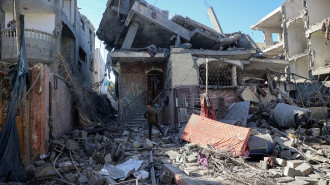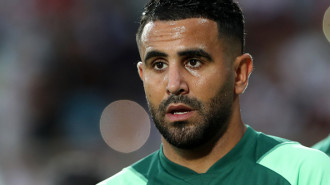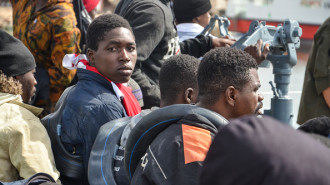Germany's Scholz to talk migrants, Mideast on Turkey visit
German Chancellor Olaf Scholz visits Turkey on Saturday for talks with Recep Tayyip Erdogan on the escalating Middle East crisis and migration, while Ankara hopes to speed up the purchase of Eurofighter jets.
Scholz, who last visited in March 2022 a few months after taking office, will meet President Erdogan in Istanbul.
Last week, German officials said the Ukraine war, the Middle East conflict and migration would be the main focus of the visit.
Turkey's relations with Germany -- home to Europe's largest Turkish diaspora of some three million people -- are sensitive and Berlin has voiced concerns over the state of human rights and democracy under Erdogan.
The outbreak of the Israel-Hamas war in Gaza has further strained ties.
Erdogan has long been a fierce critic of Israel's year-long military campaign in Gaza and its recent deadly push into Lebanon, comparing Israel's Prime Minister Benjamin Netanyahu to Nazi Germany's Adolf Hitler.
But Berlin is a strong supporter of Israel and has defended its right to self-defence, while increasingly calling for restraint.
When Erdogan visited Germany last year, he traded barbs with Scholz over the conflict.
"The first, second and third item on Scholz's agenda is likely to be refugee cooperation as anti-refugee sentiment is rising throughout Europe," Ozgur Unluhisarcikli of the German Marshall Fund, a US think tank, told AFP.
Scholz's government has been under heightened pressure over the issue after a series of violent crimes and extremist attacks committed by asylum seekers.
Last month, Berlin said it had agreed a plan with Ankara to step up its deportations of Turkish failed asylum seekers -- only for Turkey to swiftly deny any such deal had been struck.
Even so, immigration was likely to be a topic where both states "will be on the same page," said Deniz Sert, an international relations professor at Istanbul's Ozyegin University.
"Both will argue they have the right and obligation to protect order within their borders, and that irregular migrants are the threat," she said.
Turkey will also expect progress on its plans to buy 40 Eurofighter Typhoons, notably in the wake of the delayed delivery of F-16 warplanes greenlit by the United States earlier this year.
Last year, Ankara said it was keen to acquire Eurofighter jets, which are built by a four-nation consortium including Germany.
But talks have been slow to get off the ground, largely because of Berlin's opposition to Turkey's stance on the Gaza conflict.
Any member of the consortium, which also includes Britain, Italy and Spain, can veto a deal.
"The biggest obstacle to the sale of the jets is Germany's Israel policy," a Turkish source told AFP, speaking on condition of anonymity.
However in recent months things have progressed, with the source pointing to "positive developments" although an agreement was not imminent on Saturday.
"Ankara expects Berlin to suspend its restrictions on defence sales and greenlight Eurofighter sales to Turkey," Unluhisarcikli said.
Ozgur Eksi, editor-in-chief for the TurDef.com defence news website, said Berlin was originally concerned Turkey could use the jets against outlawed Kurdish militants in the southeast or in neighbouring Syria.
"Do the same concerns remain in place? Yes, but other issues including security have gained weight, especially after Turkey lifted its veto on Sweden's NATO membership," he told AFP.
With Russia's war in Ukraine, there are concerns in the West about the consequences of Turkey getting closer to Moscow, which Berlin is keen to avoid, Eksi said.
Turkey has sought balance in its ties with Russia and Ukraine since the outbreak of the Kremlin's invasion, sending drones to Kyiv but also pulling away from Western-led sanctions on Moscow.
Scholz's government in January made a U-turn on its policy of blocking Eurofighter sales to Saudi Arabia, citing Riyadh's "constructive approach" to the Israel-Hamas war.
The ban had been in place since the 2018 murder of dissident journalist Jamal Khashoggi, which halted a deal to sell the Gulf kingdom 48 Eurofighter jets.







 Follow the Middle East's top stories in English at The New Arab on Google News
Follow the Middle East's top stories in English at The New Arab on Google News


